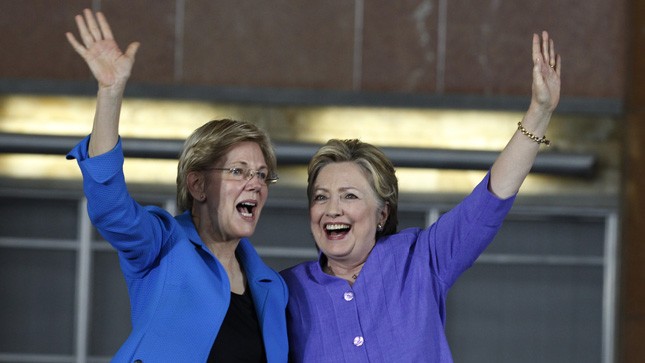
Speculation that Hillary Clinton could choose Sen. Elizabeth Warren (D-Mass.) as her running mate spiked Monday after the duo made their first joint appearance on the campaign trail in Cincinnati.
By tapping Warren, Clinton could go a long way to reassuring progressives, including those who vigorously supported Sen. Bernie Sanders (I-Vt.) during the Democratic primary campaign.
But selecting Warren would also be a gamble for the risk-averse Clinton.
Here’s what we learned from Monday’s event.
Warren is a much better orator than Clinton
Clinton has improved as a podium speaker over the years but, as she has acknowledged herself, she is “not a natural politician.”
The disparity in skills between her and Warren was especially glaring on Monday. Warren delivered a barn-burner of a speech that took aim at Donald Trump, made a strong case for Clinton and drew an ecstatic reaction from the crowd.
Clinton was enthusiastically received as well, but her speech lacked the élan of Warren’s and often relied upon political boilerplate.
Warren’s capacity to fire up a crowd could recommend her to Clinton as a running mate. But it’s equally plausible that Clinton and her aides would be wary of Warren’s potential to overshadow the presumptive Democratic presidential nominee.
Clinton really wants Warren supporters on board
Clinton and Warren have had a testy relationship at times. But on Monday, Clinton extolled the senator’s virtues, calling her “my friend and a great leader” and adding that she was “so terrific, so formidable, because she tells it like it is.”
That warmth of Clinton’s comments highlights how diligently she is working to build bridges with the left of the party. She needs to do that for a number of reasons. The main one is that many Sanders supporters are reluctant to back her. But several opinion polls have also shown Clinton’s lead over Trump considerably diminished in a multi-candidate field that includes Jill Stein of the Green Party and Libertarian Gary Johnson.
A full 20 percent of liberal voters are considering backing a third-party candidate, according to a Washington Post/ABC News poll released on Sunday. Clinton’s enthusiastic embrace of Warren could help keep them in the Democratic fold.
Warren wants the VP slot
If Clinton’s praise of Warren was unusually emphatic, the same was also true in reverse.
Warren lauded Clinton for her values and her capacity to fight back against Trump and the right generally. “We’re here to fight side-by-side with Hillary Clinton,” she insisted at one point.
The vigor of Warren’s support was striking. It also made the speech feel like an audition — and a very effective one — for the vice presidential spot.
Warren won’t back down in her feud with Trump
One of the loudest cheers during Warren’s speech came when she slammed the presumptive GOP nominee with a phrase she has used before: “a small, insecure money-grubber.”
Warren appears to have gotten under Trump’s skin better than any of his Republican rivals did during the GOP primary process. He has returned fire by calling her “Pocahontas,” in reference to her claim of Native American heritage, and describing her as “goofy.”
But Warren made clear on Monday that she wouldn’t be stepping back from that fight.
“Donald Trump says he’ll make America great again. It’s right there! It’s stamped on the front of his goofy hat,” she said at one point. “You want to see goofy? Look at him in that hat.”
A Clinton-Warren ticket would be complicated
For all the mutual admiration on display Monday, there would clearly be some knotty issues if Clinton chose Warren as her running mate.
In particular, Warren’s deep distrust of Wall Street sits uneasily with Clinton’s record — both in terms of the presumptive nominee’s more center-left worldview and in terms of the big money she has taken for speeches to Goldman Sachs and other financial institutions.
At one point Monday, Warren noted that Americans were “angry that friends and neighbors right here in Ohio lost their jobs and their homes when Wall Street wrecked our economy.” At another point she inveighed against “big corporate interests in trade deals.”
Clinton has shifted to more skeptical rhetoric about trade deals recently — and she did so again on Monday — but she was much more friendly toward them not so long ago.
Opponents would be eager to make the most of any differences between Clinton and Warren — even tonal ones — in a general election campaign.


